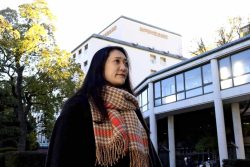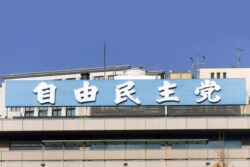
The cityscape of Tokyo
11:26 JST, May 3, 2023
Tokyo (Jiji Press)—Japan’s program of providing virtually interest- and collateral-free loans to small businesses in the midst of the COVID-19 pandemic has helped them stay afloat, thereby supporting the domestic economy.
But it is also true that the aid program has led to an increase in the number of “zombie” companies that would otherwise have been unable to continue operating.
With the repayment of such loans expected to peak this summer or later, amid higher inflation, there are concerns that some companies, unable to repay their loans, may go out of business.
The COVID-19 aid program was launched in March 2020 to provide financial assistance to prefectural governments and other entities to enable them to pay the interest on loans extended to small businesses for up to three years.
Under the program, private financial institutions accepted loan applications until March 2021, and government-affiliated institutions until September 2022. As of the end of December last year, a total of ¥43 trillion had been extended in about 2.49 million cases.
According to Tokyo Shoko Research Ltd., the number of corporate failures in fiscal 2020 dropped by nearly 20 pct from the previous year, and the number in fiscal 2021 hit the lowest level in 57 years.
The results are believed to be attributed to the interest- and collateral-free lending program. “Although businesses were worn out in the coronavirus crisis, the number of bankruptcies was historically low,” a financial industry source noted.
Meanwhile, Japan saw a surge in the number of companies that are unable to pay interest on their loans from their profits.
The number of zombie companies, as defined by the Bank for International Settlements, came to 188,000 in Japan in fiscal 2021, up about 30 pct from before the pandemic, according to an estimate by Teikoku Databank Ltd.
A surge in material costs added to the situation, making it difficult for many companies to carry out drastic structural reforms after receiving zero-interest unsecured loans.
As of the end of December last year, repayments had not started for about 40 pct of such loans from private financial institutions.
With the start of repayments concentrated between July this year and April next year, the government launched a scheme in January this year to alleviate the burden of loan refinancing.
Still, an increasing number of companies are finding it difficult to refinance their ballooning loans.
Hiroki Kobayashi, president of Tokyo-based corporate turnaround firm Mirai Financing Planning Co., predicts that the number of corporate bankruptcies will increase from now on.
“Businesses with growth potential should be revived, but (companies) should not be preoccupied with mere refinancing or surviving for longer,” Kobayashi said.
"Business" POPULAR ARTICLE
-

Japan Govt Adopts Measures to Curb Mega Solar Power Plant Projects Amid Environmental Concerns
-

Core Inflation in Tokyo Slows in December but Stays above BOJ Target
-

Major Japan Firms’ Average Winter Bonus Tops ¥1 Mil.
-

Institute: 2026 Condo Supply in Tokyo Metropolitan Area Forecast to Increase by 2.2%
-

Mcdonald’s, Starbucks in Japan Move Away from Paper Straws Amid Customer Dissatisfaction
JN ACCESS RANKING
-

Japan Govt Adopts Measures to Curb Mega Solar Power Plant Projects Amid Environmental Concerns
-

Core Inflation in Tokyo Slows in December but Stays above BOJ Target
-

Major Japan Firms’ Average Winter Bonus Tops ¥1 Mil.
-

Tokyo Zoo Wolf Believed to Have Used Vegetation Growing on Wall to Climb, Escape; Animal Living Happily after Recapture
-

JAL, ANA Cancel Flights During 3-day Holiday Weekend due to Blizzard



























